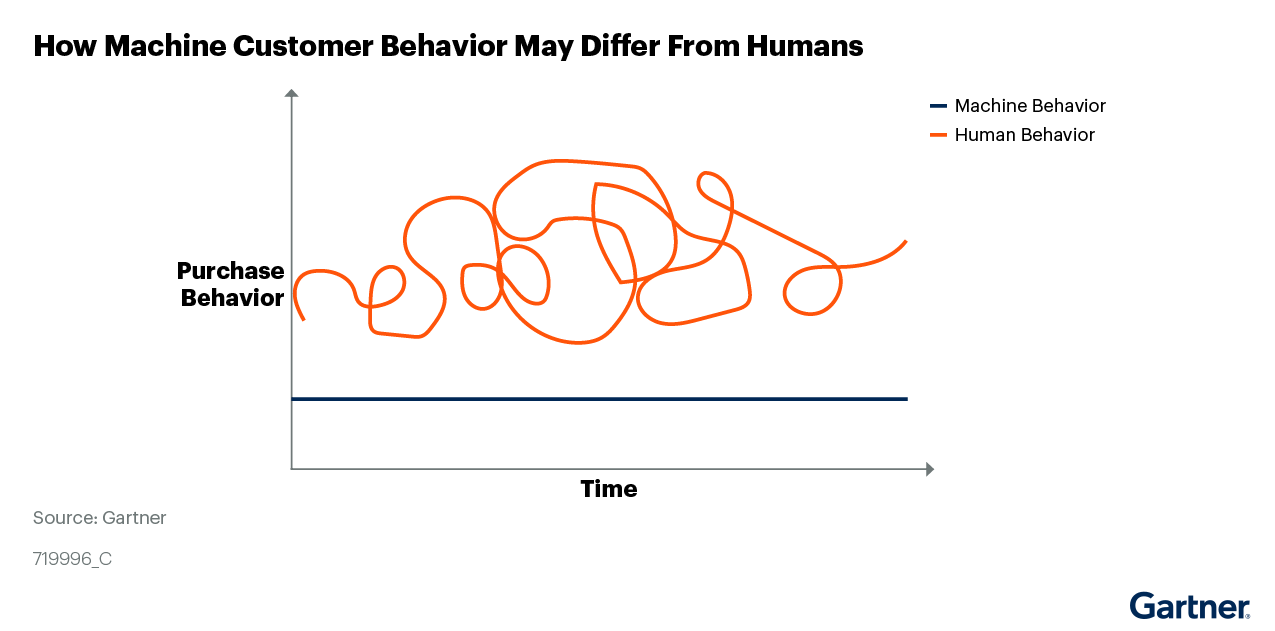May 04, 2022
- Gartner client? Log in for personalized search results.
Are Machine Customers Better Than Human Customers?
Contributor: Jordan Turner
And how the differences in buying behavior change how business gets done.
Today, smart devices outnumber people as potential buyers. Printers can order toner. Cars can procure new parts. People are also increasingly comfortable using virtual personal assistants like Siri and Alexa to support their routine tasks. As these digital assistants mature, they’ll be able to complete yet more tasks.
"According to Gartner research, by 2025, 37% of customers will try using a digital assistant to interact with customer service on their behalf," says Uma Challa, Senior Director Analyst at Gartner. Organizations must strategize now to prepare for the growing number and capabilities of machine customers.
Download the First Chapter: When Machines Become Customers Book
How do machine customers behave differently?
Machine customers buy based on data and logic
Conventional marketing and sales excellence relies on human initiative, emotion and personal contact or relationships. How will this work if you are marketing or selling to machines? Decades of insight and training in marketing and selling to human customers will need to be reconsidered. Why? Machines don’t have emotions, and they will behave logically and rationally based on rules and programming.Also, low complexity and recurring transactions from machines frees up homans for high complexity transactions.
Machines are more efficient to engage with — they are transparent and their motivation is to solve a problem. Plus, they don’t need to be delighted. A percentage of resources spent on exceeding human customer expectations and appealing to emotion are diverted to making the machine transactions seamless.
However, this isn’t the case across the board. The impact of machine customers will vary by industry, situation and geography. If decision making is rational, a machine customer is great. If emotion plays a vital role in the purchasing decision (think: luxury goods or other indulgences) or the project is complex (like, custom-built IT projects), selling to a machine customer will not be easy, or occur at all.
Download now: Emerging Trends in Customer Service Technologies
Machine customers are reliable
Reliability is how organizations build trust with customers. Does the product or service live up to its promise? How reliable and predictable are we as customers? In truth, the purchase journey for us as human customers may not be as linear as we think. Machine customers, however, are reliable. And their purchase journey is linear.
Machine customers are consistent and predictable. They order exactly what is needed at the right time, which has a positive impact on sustainability. They also can find suitable products that may be closer to the customer with lower shipping costs. They’re proactive in that they request products and services before they are needed and can recommend products that are better for long-term cost optimization.
As organizations seek a return to growth, machine customers may be a viable pathway, especially if humans want to shop at a safe distance. Machine customers won’t fully replace humans, but they will give us the opportunity to avoid dealing with low-value transactions, allowing for a greater focus on higher-priority initiatives for the organization.
Download now: Key Customer Service Priorities to Improve Operational Excellence and Grow Your Business
In short:
- People are increasingly comfortable using smart devices to make routine purchases, and machines can purchase for themselves.
- But machine customers behave differently from today’s human customers. They buy based on data and logic and are more rational, whereas humans buy with emotion and through personal connections.
- Organizations must reconsider what a customer is and how they will engage them, to fuel business growth.
Experience Gartner Conferences
Join your peers for the unveiling of the latest insights at Gartner conferences.
Recommended resources for Gartner clients*:
The Future of Customer Service and Support: Emerging Trends Through 2025 and Beyond
Why Machine Customers May Be Better Than Human Customers
Machine Customers Will Decide Who Gets Their Trillion-Dollar Business
*Note that some documents may not be available to all Gartner clients.
